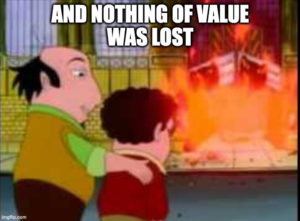A small story with possibly big implications:
Lebanon has seized a ship loaded with barley and wheat flour while it determines whether the cargo may have been stolen from Ukraine, said Public Prosecutor Ghassan Oueidat.
The Ukrainian Embassy in Beirut said the vessel was loaded at Feodosia in the Russian-occupied peninsula of Crimea, and that the commodities originated from Zaporizhzhia, Mykolaiv and Kherson in southeastern Ukraine.
The embassy accused Russia of stealing more than 500,000 tons during its occupation of the three regions. While Russia denies stealing grain, it has publicly touted the resumption of grain shipments from occupied ports.
Grain shipments from Crimea have surged since Russia’s invasion of Ukraine in February, which analysts say indicates Ukrainian grain is being exported. Exports from Crimea are sanctioned by the European Union and the U.S..
The cargo ship Laodicea arrived at Tripoli in northern Lebanon on July 27, according to ship-tracking data monitored by Bloomberg. It will be held while Lebanon carries out an investigation into the cargo’s origin, Oueidat told Bloomberg.
Supposedly the seizure is limited to 72 hours. We’ll see.
The ship’s registered owner is Syria Mar Shipping Ltd., according to European database Equasis. Syria Mar Shipping Ltd. wasn’t immediately available to comment. Both the company and the ship were sanctioned by the U.S. in 2015 for their association with the Syrian government of President Bashar Assad.
Syria, of course, is a neighbor that has repeatedly interfered with Lebanon through its terrorist proxy/political party Hezbollah, though current Lebanese President Michel Aoun usually counts Hezbollah as a parliamentary ally. (Summarizing the weird twists and turns of Lebanon’s ever-shifting multi-confessional political landscape is way beyond the scope of this article, though if you’re really interested, reading Michael Totten’s The Road to Fatima Gate might help.) The fact that Lebanon, a small and broke country, is willing to defy both Russia and Syria, speaks to how unified much of the world is against Russia’s invasion of Ukraine, and how little such countries fear Russia’s wrath these days.
Indeed, the “broke” part may be the deciding factor here, as Lebanon is seeking a $3 billion bailout from the IMF (which is demanding enactment of serious reforms before handing the money over), and the big backers of the IMF are all firmly on Ukraine’s side.
Russia was already having trouble shipping oil and other commodities due to refusal of insurance companies to underwrite marine policies on Russian ships, an issue that locks them out of most ports.
If counties like Lebanon (somewhere around the 100th largest economy in the world) are willing to seize illicit Russian cargo, then the opportunities for Russia to financial benefit from its illegal occupation of Ukraine would seem to be thin.
